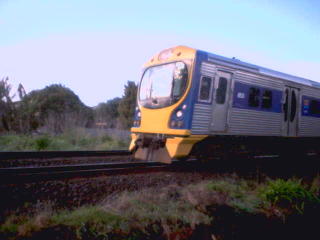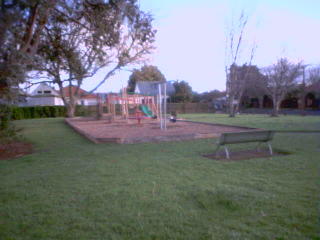Thursday - Dialogue

I'm back to school!
And starting today, this blog is visual as well as verbal. It started with this fantastic holey log I saw on the way to "school" today. This is on the Oakley Creek Walkway, at the Mount Albert end.
I thought "Damn, I forgot my camera". Thank God for the cellphone! :)
I had a specific goal in mind today: find out where that other path went. In fact that's my specific goal most times I'm walking. I hate just walking, but I love discovering.
Last time I'd discovered the end of the Oakley Creek path: a small reserve with a playground at one end. But I hadn't explored the other end, and it looked interesting. So, tired and sweaty as I was, I went up the gentle hills and trekked until I found the end. And it was....

...the train track!
That was kinda exciting and disappointing at the same time. Exciting because, wow, it's a train track! Disappointing because there was no getting across, and nothing particularly to get across to (unless I wanted to scale the barbed wire fences at the back of Pak'n'Save!).
Anyway. I went back to the playground and studied today's chapter of The Writing Experiment: Dialogue.
"Dialoguing is fundmental to the way we use language: we are usually speaking to, or writing for, someone."
In a break with tradition, I actually did most of the exercises today instead of just reading about them. I had the benefit of an early start (7:30am when I sat down at the playground, pictured).

I marvel all the time at the difference in approach between Story and The Writing Experiment. Story is all about character; Writing encourages you to use words themselves to generate literature.
So to begin dialogue, simply have a question with different answers. The answers explicitly or implicitly begin to tell a story. The example question in the book was "What time will you be home tonight?", which could be an innocent question or a loaded one. And the answers usually told you what the question really meant.
So I tried the question/answer thing, and here's what I came up with:
Q: What's the score?
A: Dunno. (apathetic)
A: 13 - 24. We're winning! (enthusiastic, these two dialoguists are having a good time)
A: The score for what? (either sarcastic or ignorant. Not meaningful communication)
A: Yes, what's the score indeed... (sarcastic, casting aspersions)
A: Stop being distracted! (trying to talk about important stuff, interrupted by sports)
A: Always about the score, isn't it... ? (Um.. dunno. Just snarky, that one)
Then we went into realist vs. non-realist dialogue. Realist dialogue is what you'll find in most plays, movies and novels. Non-realist is what you'll find in some modern literature, but it doesn't tend to sell well because nobody understands it!
However, a good example of nonrealist language was George Lucas' first film THX-1138, which used nonsensical word combinations to create a feeling of unease. It worked there because it was in some sort of context.
So, my attempt at a simple realist dialogue. It got quite dramatic:
1. Are we there yet?
2. Not far to go now. How're you feeling?
1. Still a little woozy. What time are we getting there?
2. Shouldn't be long to go.
1. I'm not feeling well...
2. I know. Hold tight; we're nearly there.
1. I don't think I can make it.
2. Come on, you can make it-
1. I...
2. Come on, we're nearly there. Don't give up now-
1. Give... up...
2. Don't! We're nearly there!
Sad story, huh? So then I non-realisticised it:
1. Are we there yet?
2. Spring is soon
1. Why is you?
2. Nonsense. Wouldn't have it any other way.
1. Really?
2. Yes. When are we there?
1. Yesterday I suppose. Don't know really.
2. Looks like rain.
1. Impossible.
2. Impressive. We're there.
Ridiculous, but then that's the idea. I found that hard because I like to create things that mean something.
The next thing was about power relationships in dialogue, the background coming from the theories of Michel Foucault that every relationship is about power. And therefore, about politics. I hate thinking like that, it doesn't come naturally to me and I don't agree that this power thing is as all-pervading as Foucault proposes. But I can understand it in certain settings.
For the exercise I did a piece of dialogue that showed a change in the power relationship. See what you think:
1. (Immigration officer) Will you be visiting on leisure or business?
2. (Foreign traveller) Uh.. sorry, leisure? (doesn't understand)
1. (slowly) Lei-sure.
2. I don't understand.
1. (louder) Leisure. Will you be visiting on LEISURE or business?
2. Do you mean... holiday?
1. Yes, holiday. Holiday or business?
2. I ... yes, holiday.
1. Right.
2. And business.
1. (pauses) Both?
2. Yes.
1. Both leisure and business
2. That is correct
1. What is the nature of the business?
2. I give talk on uh... tourism.
1. A talk on tourism?
2. Yes, how you say, lecture.
1. Oh.
2. Yes on how the immigration process can make visitors feel, uh, how you say...
1. (makes vague guilty, embarrassed, helpful sounding grunts... she doesn't know what word he's reaching for)
2. Disempowered... yes, that's the word. Disempowered.
Dialogue can change the power relationship, or go from low levels of communication to high levels (or vice versa). It struck me as similar to the Story idea of beats or events which are all about something changing for the protagonist.
Writing's example was Jane Eyre's proposal scene, where at first the characters are hiding their feelings from each other. As Jane confesses her feelings for the guy, the scene progresses to where they're communicating well.
Here's my attempt at a dialogue which starts out on a very low level of communication, and in the end breaks through into clear, open communication:
Two guys
1. Gidday mate!
2. Oh, gidday, how's it going?
1. Yeah good, hey what're you doing after work?
2. After work?
1. Yeah, how'd you fancy a bite to eat?
2. Uh... no, I'm okay actually
1. Nah, nah, my shout mate, honestly
2. Oh, don't worry about me...
1. I insist. (sobers) Please.
2. Uh... sure.
(pause)
2. Everything okay with Jennifer?
1. How did you - (his voice breaks) No. Everything's not okay.
2. What's wrong?
1. Me! (angry) I'm wrong. All the time. I'm Mr. Wrong!
2. (pause) Gee. Dunno what to say.
1. She's left me, John.
2. The bitch.
1. Watch out what you say; I still love her!
2. Just trying to sympathise mate.
1. Yeah, I know. Thanks.
2. Let me guess. You knew I'd understand, right?
1. (nods)
2. Did Jenni leave you for another guy?
1. (pause) I don't know for sure. But yeah... I think so...
2. And you think you're wrong? Mate! ... So where are we going for tea?
I'm still not really really happy about the end line. The sentiment is, now I understand you, and I understand why you wanted to have dinner with a friend rather than alone.
So that was dialogue. There was a bit more, which I didn't get the opportunity to do the exercises for (it rained). But it was great to get my teeth into this chapter, a real enjoyment.
On my way back I surprised a pukeko, which ran off then flew to the top of a tree:

Can you see the pukeko? (Sorry, no zoom lens on my phone!)



0 Comments:
Post a Comment
<< Home